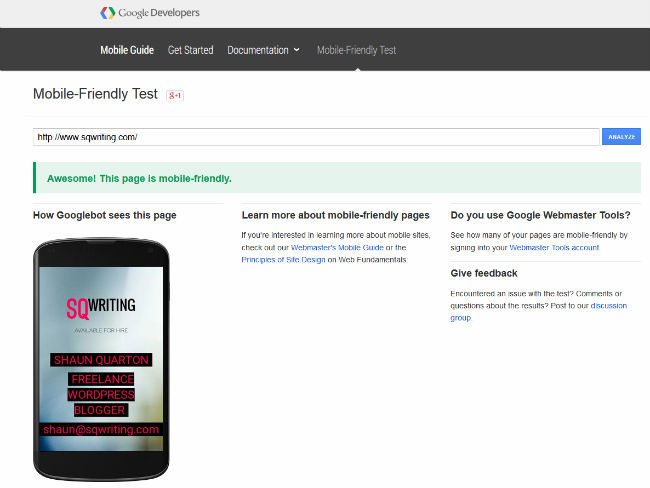Mobilegeddon is finally here.
That’s right; today, April 21, Google unleashed the biggest algorithm shake-up in several years.
The algorithm change specifically targets mobile searches. With an ever-growing number of mobile users, Google has been trying to enhance its mobile-friendliness for months now—something I first touched on in November 2014.
Unlike the other major algorithm changes—notably Penguin and Panda—Google has been relatively open about the changes. They announced in February that the mobile-friendly update would be coming, and even provided a set of guidelines and testing tools to ensure your website wouldn’t be impacted too badly.
This makes a lot of sense: previous algorithm updates targeted ‘bad’ content and aimed at preventing SEOers from gaming the system—as such, a level of secrecy was necessary, even if it proved unpopular.
With the mobile-friendly update, however, a good degree of transparency was required so we can collectively make the internet a better place for mobile internet users.
Who will Mobilegeddon affect?
So what should we expect from Mobilegeddon?
Well, for the record, the algorithm update will only impact mobile search queries. The algorithm for desktop and tablet searches remains unchanged for now.
With the new mobile algorithm in place, the websites Google deems to be non-mobile-friendly will be penalized in mobile search results. If your website isn’t optimized for mobile devices, don’t be surprised if your website starts tumbling down the mobile-SERPs. If your website depends heavily on mobile traffic, this will certainly be a cause for concern—the loss of mobile traffic could be crippling for your business.
Likewise, if your website is properly optimized for mobile devices, you might experience a pleasant uplift in mobile traffic.
It’s also worth pointing out that the algorithm changes will only impact organic search results. If you’re running an AdWords campaign targeting mobile users, you’ll be pleased to hear that the paid ad listings are outside the reach of this update.
For small, local businesses (who may not have the budget to address any mobile optimization issues), 
That means when someone in your area tries to search for a local service, your website won’t be penalized—the searcher will still be able to see your business’s name, telephone number, rating, opening hours, address, and view them on the interactive map.
The same applies to ‘branded’ search queries—if someone searches for a brand name, the official website is always the best destination, even if the website isn’t mobile-friendly.
Google verses webmasters
Although the mobile-friendly algorithm changes will prove unpopular with anyone negatively impacted, in my opinion it seems like a fair update.
Many of the major algorithm updates of the past felt like a battleground between Google and webmasters. In this instance, I don’t think this is the case—Google doesn’t seem to be actively looking to penalize anyone.
Google has given fair warning of the impending changes, as well as giving website owners everything they need to make sure their websites comply with the new mobile rules. This level of transparency is definitely a good thing, and will hopefully go some way towards repairing webmasters’ mistrust of Google.
If Google was this open before all algorithm updates—including their motivations behind the update—fewer people would have a problem with them.
I also think that Google has shown a good degree of understanding towards smaller websites who can’t afford to update their website to comply with mobile-friendly guidelines. For example, small local businesses—who perhaps depend on search engine customers for their survival—won’t suffer. These businesses will still appear in the SERPs in some form, whether the website is mobile-friendly or not, and just as prominently.
If you perceive Google to be primarily ‘money-grabbers who only care about their paid ads’ then the fact that the new algorithm won’t impact paid listings might cause a few suspicious glances. If Google really cared about a mobile-friendly user experience, they should make sure their paid ad section is only populated by mobile-optimized websites, too.
For the most part, though, I think we can all agree that, with more and more mobile users, we need to make the internet a more mobile-friendly place. This starts with the search engines, and Google hasn’t made too many mistakes with this algorithm update.
Is my website mobile-friendly?
As I’ve mentioned throughout this article, Google has been unusually transparent about what it considers a mobile-friendly website to be.
If you want to make sure your website meets Google’s criteria, here are a few important tips.
- Google SERPs – Search for your website on a mobile device to see if it has the mobile-friendly label. If it does, you know your website has already been approved as mobile-friendly by Google.
- Mobile-Friendly Test – Analyze your website to give it the mobile-friendly stamp of approval. If your website fails, you will be told how you can improve.
- PageSpeed Insights – We know speed is a ranking factor, but this is especially true for mobile searches where internet speed is usually slower. This tool will rank your mobile speed and suggest where to make improvements.
- Google Hangout Q&A – This one-hour session answered many questions around the mobile-friendly update.
- Common Mistakes – Google have also outlined some of the common mistakes that non-mobile-friendly websites are making.
Final thoughts
If you take your website seriously, most of you have already ensured your website is optimized for mobile devices—in which case, the new algorithm update won’t concern you. An un-optimized website is throwing away customers, leads, and conversions already, so the issues need to be resolved for reasons beyond the algorithm update.
For WordPress users, a responsive theme is the perfect starting point for mobile-friendliness, and the vast majority of themes these days will fit the bill. This means that, with just a little effort, all WordPress users should be able to meet the mobile-friendly requirements, and this means none of us will be overly affected.
As always, Torque will keep all WordPress users up-to-date when Google algorithm updates break. Mobile-friendly algorithm changes are likely to continue to dominate Google’s thoughts and plans, so we will be sure to let you know how the changes impact you.
Are you ready for Mobilegeddon? Share your thoughts in the comments section below!


No Comments
Start the conversation